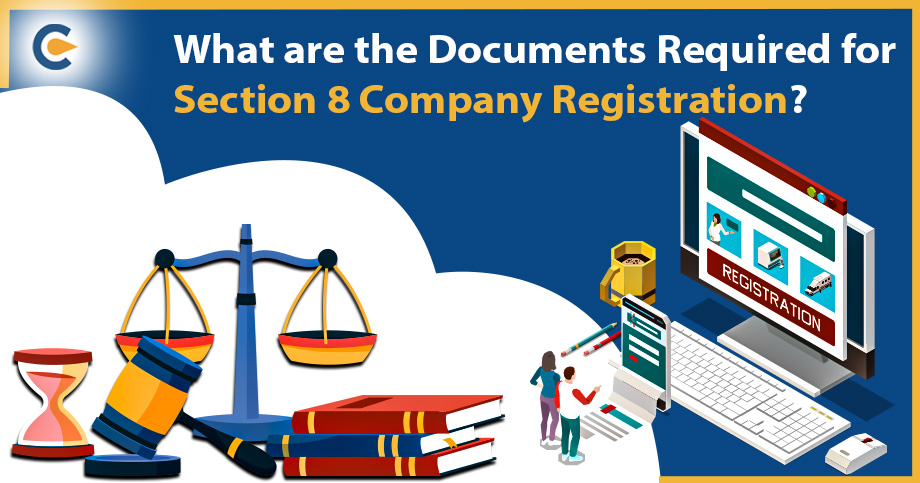The definition of “company” is given in Section 2 (20) of the Companies Act of 2013 as “company refers to a corporation established in accordance with this Act or a previous company law.” In India, the idea of a non-profit organisation is not new. Non-profit organisations were first controlled by Section 25 of the Company Act of 1956, which is why they are sometimes known as Section 25 Companies. Section 8 of the Company Act of 2013 now includes regulations relating to non-profit organisations, together with Rules 19 and 20 of the 2014 Companies’ Incorporation Rules. In this article, we will talk about Documents Required for Section 8 Company Registration.
According to Section 8(1a, 1b, and 1c) of the Companies Act of 2013, anyone can incorporate under Section 8 to promote commerce, art, research, social welfare, science, sports, education, religion, charity, protection of the environment, but added a point to this is they are intended to use their profits or other income, if any, only in promotion of their objectives and intend to forbid paying any dividends to their members.
A few examples of businesses established under Section 8:
- Federation of Indian Chambers of Commerce & Industry;
- Reliance Research Institute (RRI);
- Reliance Foundation;
- A Deemed University like Christ University;
- Over the Counter Exchange of India (OCE), etc.
Characteristics of Section 8 Companies
Before we discuss the vital documents required for Section 8 Company Registration, lets discuss the characteristics of Section 8 Companies. Following are some characteristics of Section 8 Companies:
- No Minimum Capital
There is no requirement for a minimum share capital. The required finances are raised through donations, membership dues, or general public subscriptions.
- Limited Liability
One of the advantages of registering as a Section 8 company is the limited liability. To put it simply, the members of the company remain unaffected in the case where liability arises.
- No Dividend Distribution
Members of the Company are not allowed to distribute the dividend among themselves.
- Separate Legal Entity
Like any other company, a Section 8 company is regarded as a distinct legal entity. It has a separate legal status from members. Thus, it can sue and be sued in its own name. It also has a perpetual existence.
Advantages of Incorporating a Company
Section 8 companies work solely for the benefit of the public. Therefore they receive specific benefits. Let’s examine these benefits:
- No minimum capital is required for a Section 8 firm, unrelated to other companies. They have the flexibility to change their capital structure as needed.
- When registering, stamp duty must typically be paid, although section 8 companies are exempt from this requirement.
- Any registered partnership business may join a Section 8 company as an individual member.
- Companies registered under Section 8 of the 2013 Companies Act are eligible for a number of tax benefits. For instance, Sections 12AA and 80G of the Income Tax Act provide tax incentives to contributors of Section 8 companies.
- A corporation incorporated under Section 8 is more credible than any other Not for Profit Organization (NPO), such as a trust. This is because the corporation is licenced by the Central Government, which may impose strict regulations. As a result, the organisation gains a more trustworthy reputation.
- Like any other company, a Section 8 company is regarded as a distinct legal entity. It has a separate legal status from members. Thus, it can sued and being sue in its own name. It also has a perpetual existence.
- Section 8 businesses have a lot of flexibility because it is considerably simpler to transfer ownership and title in these.
Eligibility Criteria for Section 8 Company Registration
Before proceeding with the registration procedure, all business organisations that intend to register as Section 8 companies should review the list below to check your availability:
- To register a Section-8 company in India, one must be an individual, HUF, or limited company.
- Two or more individuals who will act as shareholders or directors of the company. They must adhere to and meet all the criteria of Section 8 Company registration.
- At least one of the directors shall be a resident of India.
- The aim behind the incorporation of Section 8 Company should be to promote sports, social welfare, the progress of science and art, education, and financial aid to lower-income groups.
- The surplus generated must only be used to achieve the primary goal of the section 8 company.
- No compensation of any type, including cash, profit or stock, may be received by the company’s founders, members, or directors.
- The company should have a defined strategy and project plan for the upcoming three years.
Documents Required for Section 8 Company Registration
Registering as a Section 8 Company is outlined in the Companies Act of 2013[1]. An application in Form No. INC.12 must be filed to the Registrar of Companies, and the supporting documents required for Section 8 Company Registration is listed below:
- If the promoters and directors are citizens of India, PANs cards for each director are required. Along with this, additional identifying documents such as a voter ID, an Aadhar card, or a driver’s licence may be provided;
- A passport is necessary as identification in the situation where the director is a foreign national;
- Any proof of residence, this could be a telephone bill, electricity bill, etc. It cannot be more than two months old;
- The most recent passport-sized photograph of each director and promoter;
- Address proof for the company’s registered office. This could be the lease and payment receipt, or any document proving ownership, such as the sale deed, is necessary if the director is the one who owns this;
- Director Identification Number (DIN) (if any);
- Digital certificate (if any);
- Memorandum of Association – Form no. INC – 13;
- Articles of Association – Form no. INC – 13;
- A Declaration that the draught MOA & AOA are consistent with the provisions & regulations of section 8 – Form INC-14;
- A declaration on stamp paper & notarized by each member of the company – Form INC-15.
Procedure for Incorporation of Section 8 Companies
After discussing the vital documents required for Section 8 Company Registration, now we proceed with the procedure to register as a Section 8 company, follow these simple steps:
- The first step is to obtain a Digital Signature Certificate (DSC)of the proposed Directors of the company;
- After receiving a DSC, file Form DIR-3 with the Registrar Of Companies to get a DIN;
- Once the DIR-3 is approved;
- Draft MOA and AOA;
- File the Form with Form INC-12 with the Registrar Of Companies and submit it along with the crucial documents required for Section 8 Company Registration;
- Once the form gets approval from the Central Government, a licence will be issued in Form INC-16.
Conclusion
Incorporating a company under Section 8 is particularly convenient for encouraging more people to contribute to society and rewarding those who currently do so. It does not take long and comes with several benefits and eased norms. You can quickly incorporate a Section 8 corporation as long as you fill out the proper procedures and have the necessary documents required for Section 8 Company Registration on hand.
Read Our Article: How to Avail a Company Registration Certificate?











